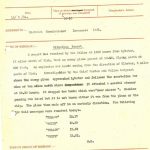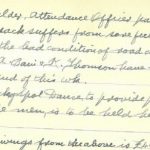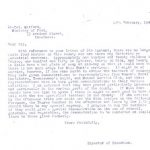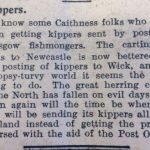This week German reinforcements under Erwin Rommel (the famous “Afrika Korps”) landed at Tripoli, and began to move on British positions in Libya; the British forces in the Western Desert had been weakened by the decision last week to move some of their troops to Greece. Meanwhile in Malta German air superiority meant that the island was subjected to intense daily bombing raids; and on 15 February the deportation of Austrian Jews to Polish ghettos began.
 Shipping off Caithness was still at risk of attack by German planes. On 12 February the police recorded, “At 22.30 hours tonight a naval vessel landed ten survivors from the crew of a British trawler, which was sunk by enemy aircraft off Lybster tonight, at Helmsdale Harbour … They are uninjured.”
Shipping off Caithness was still at risk of attack by German planes. On 12 February the police recorded, “At 22.30 hours tonight a naval vessel landed ten survivors from the crew of a British trawler, which was sunk by enemy aircraft off Lybster tonight, at Helmsdale Harbour … They are uninjured.”

Then, on 15 February, “A report was received by the Police at 1300 hours from Lybster … that an enemy plane passed at 12.15, flying north at 200 feet. An explosion was heard coming from Ulbster … the enemy plane approached Lybster and followed the coast-line for nine or ten miles north where it attacked a coastal steamer as 12.30 hours. It dropped two bombs which were “near misses”. Machine gunning was heard but it is not known whether it was from the plane or the ship.”
 Meanwhile, local communities in Caithness continued to support those serving in the forces. Gillock School in Bower recorded in its log book on 14 February that, “A Lucky Spot Dance, to provide parcels for local service men, is to be held here to-night.”
Meanwhile, local communities in Caithness continued to support those serving in the forces. Gillock School in Bower recorded in its log book on 14 February that, “A Lucky Spot Dance, to provide parcels for local service men, is to be held here to-night.”
The Director of Education had been asked about cookery in schools, and on 10 February he  replied: “Approximately one hundred and twenty children in Thurso, one hundred and fifty in Lybster, thirty in Wick and twenty in Keiss have a hot plate of soup at mid-day.” There was scope for cookery demonstrations to be arranged for local women’s societies. “I propose to ask the teachers if they could give a special demonstration on the use of oatmeal, potatoes and vegetables.”
replied: “Approximately one hundred and twenty children in Thurso, one hundred and fifty in Lybster, thirty in Wick and twenty in Keiss have a hot plate of soup at mid-day.” There was scope for cookery demonstrations to be arranged for local women’s societies. “I propose to ask the teachers if they could give a special demonstration on the use of oatmeal, potatoes and vegetables.”
Finally, the John O’Groat Journal reported that, now that “the great herring centre of the North has fallen on evil days”, Glasgow fishmongers were sending kippers by post to Caithness (“the carting of coals to Newcastle is now bettered by the posting of herring to Wick”). “When again”, they wondered, “will the time be when the port will be sending its kippers all over Scotland instead of getting the process reversed with the aid of the Post Office?”
